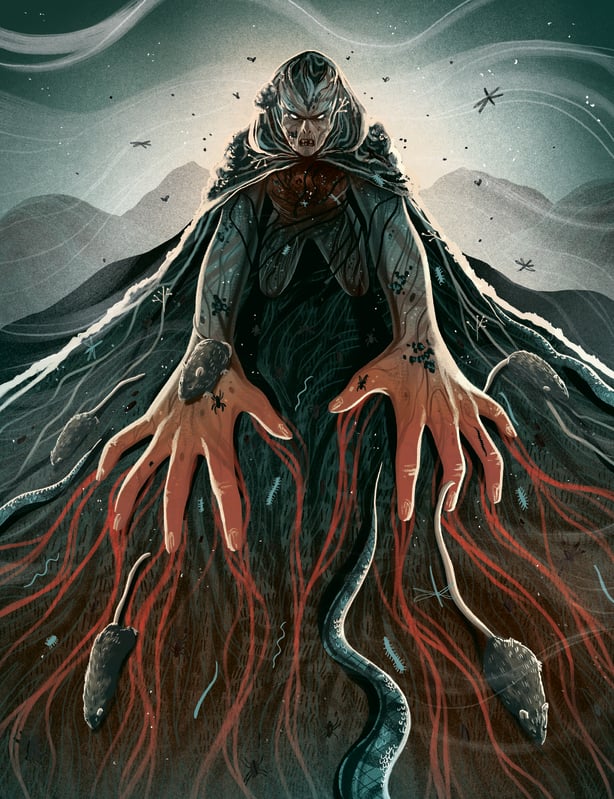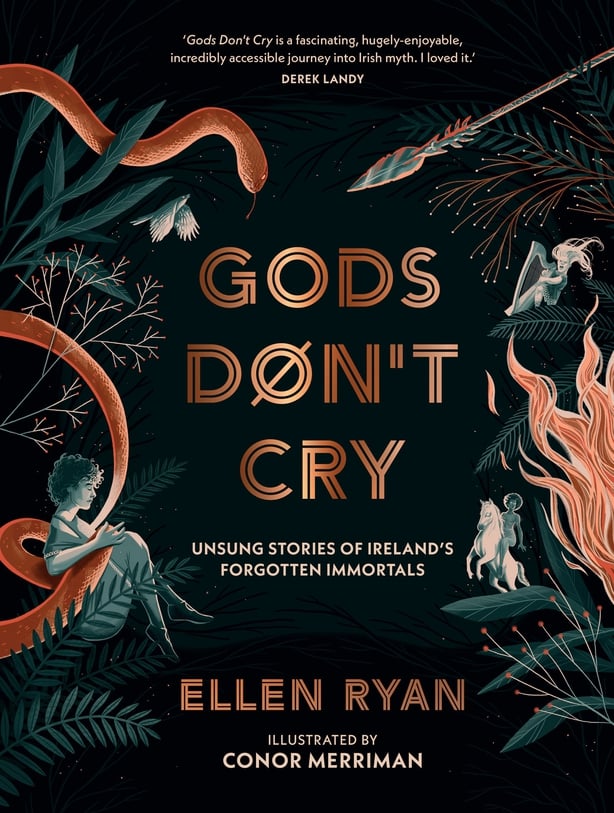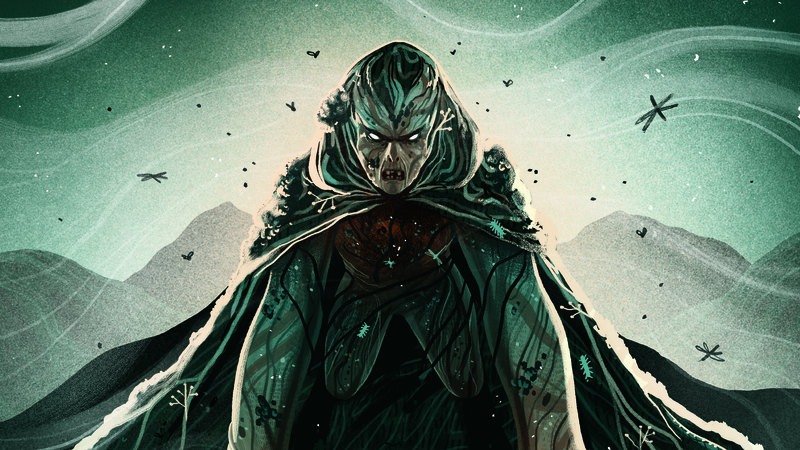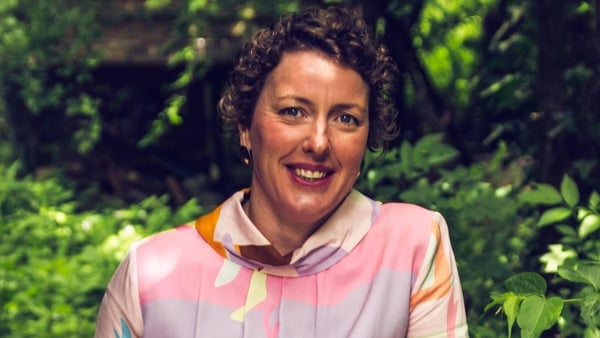We present an extract from Gods Don't Cry, the new book for YA readers written by Ellen Ryan and illustrated by Conor Merriman, shortlisted for Children’s Book of the Year – Senior at this year's An Post Irish Book Awards.
The ancient gods of Ireland were once worshipped throughout the land. Powerful and brave, they were unafraid to show their vulnerability, reject violence, or lean on others for support. Sadly, their stories – passed down by our ancestors – are all but forgotten.
Gods Don't Cry reawakens these gods, whose ancient tales redefine modern ideas of what it means to be a hero. From Manannán, who uses his neurodiversity to discover the Otherworld, to Cnú Deróil, who overcomes bullies with his musical talent. Hurlers and warriors, academics, and activists – these are gods of many abilities, sizes, and skin shades, from every corner of Ireland.
Crom Cruach, Exterminator, Cavan, Ireland
Crom Cruach (Crom Kroo-uk) was a mystery.
His mother had been a volcanic hill – an ancient power that spat fire and shaped the earth, creating life and taking life.
She watched as the earth’s first creatures crawled out of the sea, began to walk, feed – and kill. Blood seeped and bodies decayed, their life force soaking into her soil and slowly gathering to form a new life force inside of her. Until, one day, the hill erupted – not with fire but with a young god.
The child rolled down its mother’s curves, scrawny and bawling with hunger.
Other gods heard the cries and found little Crom lying in a nearby plain in County Cavan. They tried to feed him – but no cow’s milk could satisfy this baby.
So the gods gave him the tastiest foods they could think of: meaty puffball mushrooms, roasted in wild garlic, and nutty-scented sheep cheese, drizzled in blackberry vinegar.
Crom found these dishes disgusting and none nourished his body.
Instead, he cried out for the blood his mother had fed him in the comfort of her soil. He could smell its coppery scent pumping through cows in the fields.
He imagined the feel of its sticky warmth between his fingers. And he would give up all his godliness to be a tiny flea, if only he could gorge on another’s life force as they did.
But the other gods told him it was wrong to want such things. So he kept drinking cow’s milk and eating grain and grew to be a boy, though he never thrived and was often gaunt and sickly. As the years passed, Crom’s body became more shrivelled, and by the time he neared his teens, the young god was bent over and barely able to walk.
The vermin and swarms of flies that normally plagued mortal farms followed him around, as if he were something dying or dead. And as he walked through the fields of Cavan, livestock dropped dead as though infected with his wasting hunger.
Eventually, his fellow gods could take no more. 'You are a god of hunger’, they declared, ‘and could destroy Ireland with such terrible power. Perhaps we should destroy you.’
Crom was horrified. He didn’t want to disappoint his people, and he certainly didn’t want to be killed. So he tried to find a way to appease the gods and show them that his strange power could be used for good.
‘You know I can draw insects and vermin to follow me,’ he said. ‘How about I draw them away from mortal farms? Then they cannot plague Ireland’s crop fields or livestock. Our mortals will thrive. I will be a god of good harvests – a god of plenty.’
Crom’s elders were impressed by the plan, but doubtful he would see it through. ‘Could a god with such deadly power dedicate himself to the care of mortals?’ ‘
Why not?’ Crom asked. ‘I can’t satisfy my appetite, and my body is failing, but perhaps I can find nourishment in providing food for others.’
So the young god travelled to a small corner of County Cavan, away from all other gods and mortals. There, he stopped eating altogether and his body withered rapidly until he was little more than a living corpse. But his plan worked. Mice, rats, and parasitic insects fled the farmlands and flocked to his side. Crom lived every day by himself and was constantly hungry and ill.
But across Ireland, crops grew in abundance, and pigs and cattle thrived. So from that time onwards, the god was loved by tribes throughout Ireland for his sacrifice on their behalf. And every year, after harvest time, mortals came to the Plain of Prostration in Cavan to visit and thank him. These worshippers battled through swarms of mosquitoes, crows, termites, and rats until they reached the great god Crom. They kneeled before him, offering up gifts – as much milk and grain as they could spare – to honour Crom’s kindness and care for that past year.

A hunger that had no intention of being reined back in.'
And though Crom could take no pleasure in milk or grain, he was comforted by their gratitude. So, for century upon century, he provided for the Irish, accepting their small offerings as thanks for his life of hunger and sickness.
But after all that time, things began to change. From overseas a new religion came to Ireland, and it swept through the mortal tribes – who readily pledged love and loyalty to a new all-powerful god.
After all his sacrifice, Crom was enraged. ‘These ungrateful mortals turn from me now,’ he fumed, ‘as if I had never mattered! I shouldered every disease that once rampaged across this island so they could eat well and live long!’
And the hunger that dwelt inside the god now swelled and grew. In a fit of rage, Crom banished all the insects and vermin. They scattered away over the land. Next, he focused on the illness within him and banished that too. The disease that once took hold of him now left his body and spread throughout Ireland, like a rolling storm that blotted out the sun.
Crom felt free.
But across the island, mortals could only run to the safety of their shelters as plagues of insects devoured their crops and diseases slipped through the cracks of every barn, and seeped under the skin of livestock, souring milk and rotting their animals from the inside out.
The Irish wept and begged their old god to save them. ‘Forgive us for abandoning you!’ they cried. ‘Save us from such horrors, and we will give you twice as many gifts as before!’
But Crom had released an inner hunger that had waited too long to get out. A hunger that had no intention of being reined back in.
‘You may come crawling back to me,’ he told the mortals. ‘But this time, if I am to fill your plates, I must be fed too. I no longer accept your measly milk or grain offerings. Only your blood – your fleeting yet powerful life force – will satisfy me now.’
Despairing but desperate, the people agreed. And at the next harvest, they chose a member of their tribe to offer up.
When they took their human victim to the Plain of Prostration, the blood of their sacrifice pooled at Crom’s feet, and he bent to cup the warm, red life force in his hands. He drank deep and long.
Finally, his hunger was satisfied.
Crom felt more alive than ever before. In front of the astonished mortals, his hollow body filled out, his muscles strengthening, his back straightening. His yellow, watery eyes glittered green now, his stained teeth shone white. His broken wisps of white hair thickened and lengthened into chestnut-coloured curls.
Crom felt new power surging in his veins. He walked to the nearest farm and placed his hands into the soil, feeling a connection to the land from which he was born. His new strength and vitality vibrated throughout Ireland, scattered the insects and vermin, and replenished every farmland.
The Irish mortals were grateful to their old god for keeping hunger from their doors once again. But every year, at harvest time, instead of loving the god, they hated him. Sacrificing one of their own was a horrifying task, and many tears were shed. But for fear of ever offending Crom again, they hosted feasts in his honour, and in Crom’s home of Cavan, a golden statue was erected in his honour. And for centuries, long after the old gods were largely forgotten, the locals still feared passing Crom’s statue in case he should smell the hot blood in their veins and grow hungry again.

Gods Don't Cry is published by HarperCollins Children's Books

